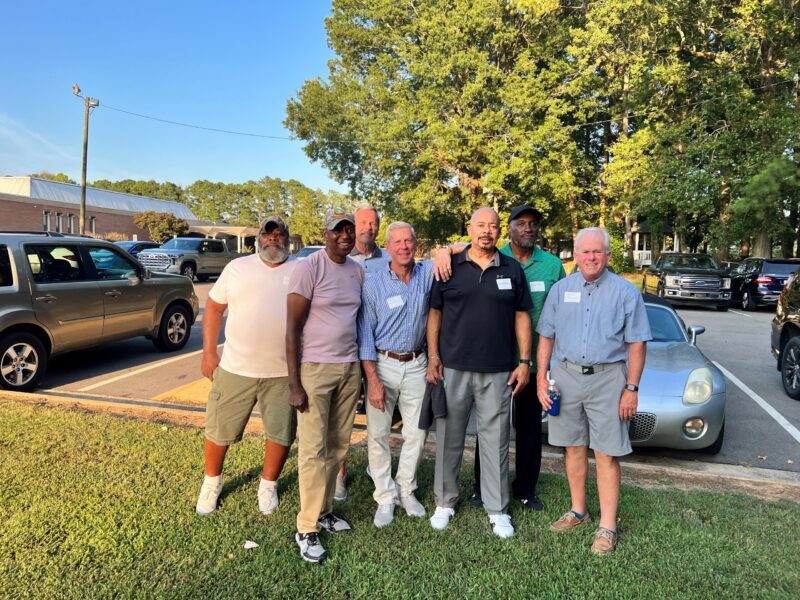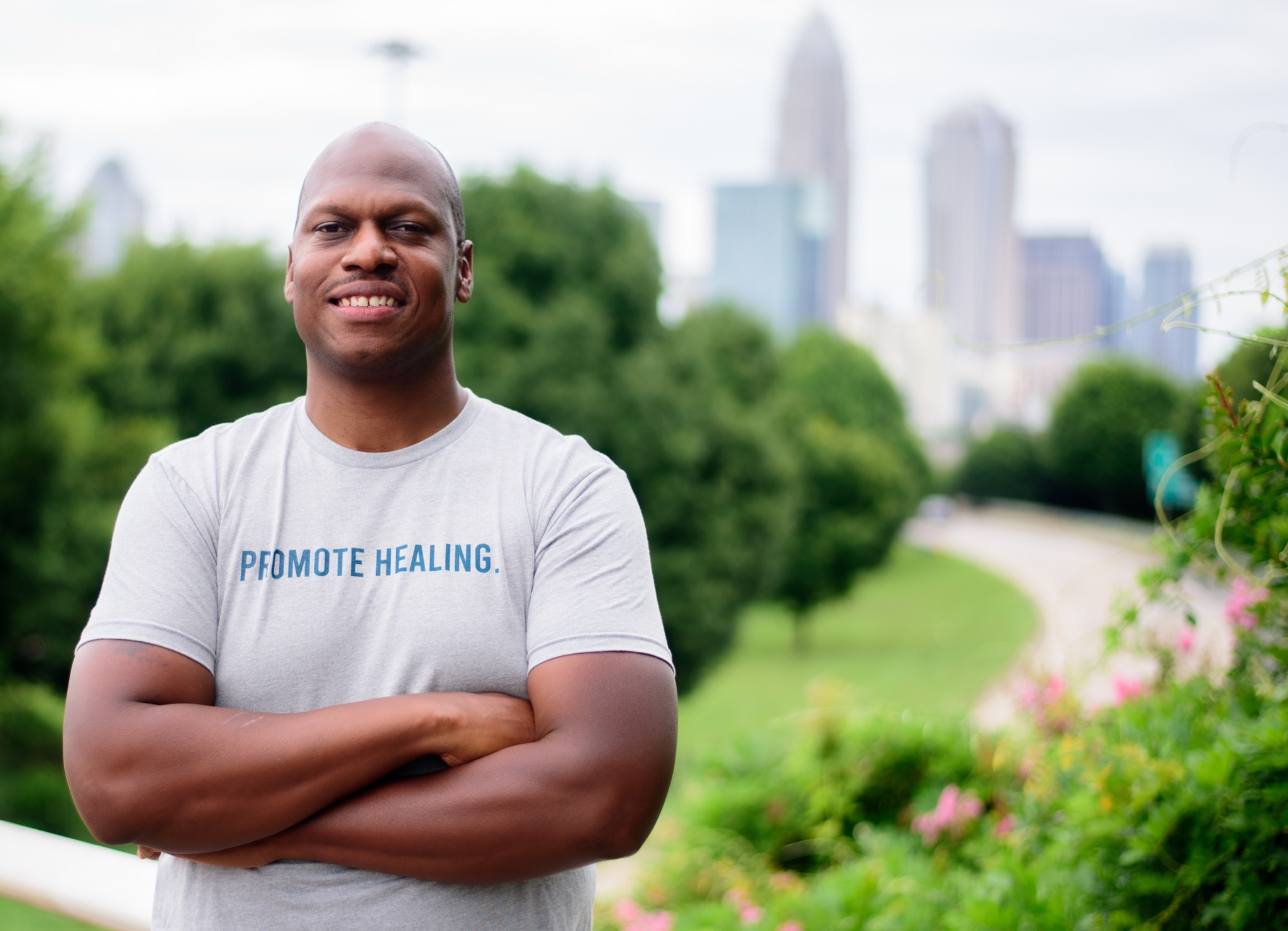
Perry (Constructively) Speaks His Mind
The CLT native, therapist and community leader weighs in on education, housing and mental health in his hometown
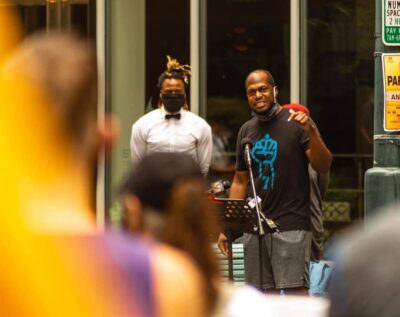
Justin Perry feels like his hometown community is still learning lessons from COVID, George Floyd and the rest of 2020.
Justin Perry’s observations about his hometown are sometimes startling. His questions can be provocative. And he’s unafraid to be outspoken.
Take busing, for instance. He said busing in Charlotte never went away – in spite of Judge Robert Potter’s 1999 decision to end busing, as the New York Times wrote, “where it began.”
“We bus more today than when I was in school,” said Perry, a therapist at Perry Counseling, former member of the Foundation For The Carolina’s Charlotte Mecklenburg Community Foundation Board of Advisors and a product of Charlotte-Mecklenburg Schools. “But now, it’s magnets and independent schools.”
“Only 41 percent of Charlotteans were actually born here, so as a native Charlottean and one of our community’s civic leaders, Justin is a vital voice,” said Federico Rios, FFTC’s senior vice president, Robinson Center for Civic Leadership, who has worked with Justin on numerous community projects. “Native Black Charlotteans were the ones who were left behind. Justin’s personal experience through that broader lens helps all of us know where to start. If you don’t center the experience around the native Charlottean – and someone as insightful about the mental health challenges being faced in our community as Justin is – you really are not going to get to applicable solutions. Justin helps those of us not from here really understand the unique dynamics in Charlotte.”
Perry – a self-described “proud social justice warrior” – isn’t afraid to ruffle feathers, to afflict the comfortable. Whether the topic be busing or affordable housing or gentrification or essential workers, Perry is honest about his opinions: “I don’t tend to blow smoke,” he said.
Brian Collier – former FFTC executive vice president and current president of The Gambrell Foundation – grew close with Perry when Perry served on the CMCF board. “He’s one of the most insightful and inspiring people I’ve ever worked with,” Collier said. “He has a unique way of challenging us to expand our perspectives and think beyond our traditional paradigms. He consistently advocated for the inclusive voices absent from our discussions, urging our boards, nonprofits, and leaders to consider those not present in the room.”
Collier praised Perry for his integrity and authenticity. “In philanthropy, we often work on behalf of individuals in our community who lack representation in the decision-making process,” he said. “Justin was, and is, a powerful advocate on their behalf and constantly pushed our perspectives on what it means to create a vibrant community for everyone. His remarkable ability to infuse discussions with urgency, focus, and empathy resulted in better outcomes for all involved.”
“Let’s do both”
For years, Perry has been helping Charlotteans see the connection between housing and education. His take? We can’t fix CMS student assignment without addressing low-income, high-poverty neighborhoods.
Once court-ordered busing ended, CMS reverted to neighborhood schools. Or so the thinking goes.
Perry said it’s a “great misconception that we have neighborhood schools. We actually have gerrymandered schools.”
As a Charlotte native and parent of two children, Perry has a long connection to CMS. Federico Rios – FFTC senior vice president, Robinson for Civic Leadership – has worked with Justin on numerous community projects and praises his leadership. He said we need to listen to native Charlotteans like Perry.
Perry has long advocated for equal educational opportunities for all. Now that he and his wife, Lee Bush (they met in second grade at Irwin Avenue Elementary School), have two children in CMS (one just finished kindergarten and the other third grade), he’s even more invested.
As chair of OneMeck, an alliance promoting more diversity in CMS, Perry pushes to end policies that maintain high-poverty schools and neighborhoods.
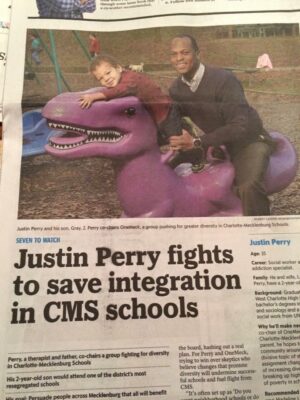
Perry, featured in an article by Ann Doss Helms with The Charlotte Observer in 2016, is a critic of CMS.
In 2016, he told education journalist Ann Doss Helms for a Charlotte Observer story: “It’s often set up as ‘Do you want neighborhood schools, or do you want diversity?’ And we’re like: Yes. Let’s look at how we do both.”
Where you live generally determines where you go to school. And where you go to school determines so much about your life. Perry’s end goal may be integrated schools but that has to start with housing.
“Charlotte never runs out of places to put luxury apartments,” Perry said. “But we can’t seem to find anywhere to put affordable housing. So, OneMeck has been trying to create affordable housing that’s dispersed throughout the community rather than concentrated.”
How? By challenging landlords to accept vouchers. People with limited incomes may qualify for – and receive – government-issued Section 8 housing vouchers, which can cover up to 70% of their rent. But in North Carolina, landlords can refuse those vouchers.
Some people, including Perry, call that income discrimination.
“The people who provide essential services – especially if your kids are in childcare – are most often Black and Brown women,” he said. “What does it say that the folks we allow to educate and develop our kids aren’t worthy of living in our neighborhoods?”
Perry often advocates for single, Black moms – the women who are front and center when performing their jobs but forgotten as soon as they leave work.
“People who work with our most vulnerable, people working in early childhood education, CNAs working with our elderly,” said Perry, ticking off some of the roles these women serve. “We should insist they be able to live in the city. They’re making a way for everybody else here to make a living.
“People have built wealth on the backs of Black women – the people we allow to take care of everything. I want us to stop using people like washcloths we wring out and then reuse.”
Knocking down barriers
Perry brought that passion for social justice – and his tough, honest talk – to the Foundation through his two terms (2016-22) on the board of advisors for CMCF, the Foundation’s primary grantmaking arm.
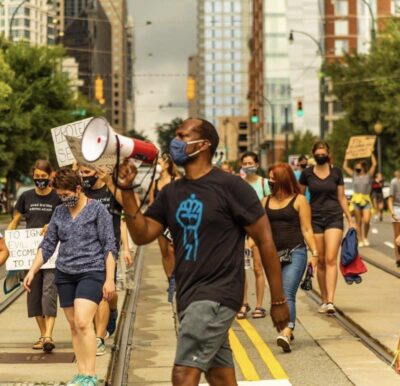
A Charlotte native, Perry was active on the streets in 2020 and beyond.
Collier marveled at how Perry navigated sensitive subjects on that board. “At almost every CMCF board meeting, we discussed difficult topics – immigration, racial equity, the state of our schools, the murder of George Floyd,” Collier said. “And Justin always had a thoughtful perspective on each. He speaks his mind, but he’s always focused on achieving a positive outcome. He doesn’t create chaos; he’s just a lovely human.”
Although Perry’s no longer on the board, his influence is still felt. He was one of the board’s representatives to the Community Building Initiative Leadership Development Initiative, a program that supports senior staff and/or board members of nonprofit, for-profit and public organizations in promoting inclusion within their organizations. Government and civic leaders established CBI in 1997 to promote racial inclusion in response to police-involved shootings of unarmed Black citizens – a problem that persists.
After going through LDI, participants identify an issue within their own organizations and devise a plan to address it. The first thing Perry did: Ask CMCF board members to read Caste: Origins of Our Discontents by Isabel Wilkerson – a book that examines the Jim Crow South, Nazi Germany, India’s caste system and more.
Then, they looked at board representation. In many cases, nonprofit boards don’t reflect the very people the organization is trying to serve. CMCF board members gave feedback on the importance of board diversity to organizations requesting grant funding.
It made a difference. Several organizations that hadn’t previously had racially diverse boards came back the next grant cycle with different board makeups.
Problems still exist, though, and there is much more work to be done to diversify local nonprofit boards. Still, Perry and team took on what he called “the country club mindset” that often permeates boards. “You need people who understand finance,” he said. “But you also need people who understand the human side – the impact not visible on a spreadsheet.”
Collier appreciated how Perry pushed the CMCF board. “(Justin) reminded us we were working on behalf of others and that we had to put our resources to their highest and best use, which includes asking tough questions. Foundation For The Carolinas is now asking questions on grant applications about board and staff representation.”
Perry said many nonprofits that serve, or are led by, people of color don’t always know how to access grant money or – worse – feel they don’t even belong at the table. Collier said Perry helped Foundation For The Carolinas open up access.
“There are populations who’ve come to believe, over decades, that foundations and similar institutions are inaccessible to them – that they’re by invitation only,” Collier said. “That may not be the reality, but that doesn’t matter because it’s the perception. Justin helped us see that and actively encouraged organizations to apply to our programs.”
Perry’s goal was to pave the way for other marginalized communities to have a seat at the philanthropic table. “We have to get more comfortable addressing racism, homophobia, sexism, classism,” he said. “We have to have those raw conversations.”
‘The fire was already burning’
We need to have raw conversations about mental health, too. We’re at a crisis point in America, but COVID, as is often assumed, didn’t create it.
“The fire was already burning,” Perry said. “COVID poured gasoline on it.”
George Floyd’s murder didn’t start it, either – although it impacted our collective psyche. “White America was waking up to the things so many of us in Black America have talked about forever,” Perry said in a video about the community’s COVID-19 response created for the Foundation’s 2022 Annual Meeting.
Perry, who earned a master’s degree in social work from the University of North Carolina at Chapel Hill, has a deeply personal reason for believing in therapy.
“I had my own dark period which led me to … leave college during my (first) sophomore year at UNC,” he shares on Perry Counseling’s website. His depression led him to shut out friends and family. But a longtime female friend encouraged him to get therapy.
“I temporarily withdrew from school, got therapy,” his testimonial continued. “Oh yeah, that girl who wouldn’t give up on me is now my wife and the mother of my two kids. So, I guess you can say I believe in therapy because I am a certified witness!”
In reference to mental health, we often hear that help is readily available if only we’re brave enough to seek it. To be sure, the National Suicide and Crisis Lifeline (call 988) is an invaluable resource. But if your mental health crisis isn’t dire, you may find yourself waiting (and waiting) for help.
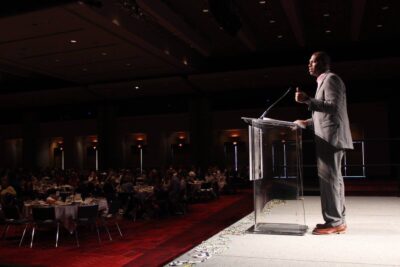
Justin Perry spoke as the keynote speaker for the Mitchell’s Fund Luncheon, where he shared with the primarily upper middle class white audience the dual harms of segregation.
“Being available, accessible and invited are all different things,” Perry said. “I can go online and find a restaurant menu, but that doesn’t mean the food is accessible to me. Even if I can get to the restaurant, I may not have enough money to pay for it. I think that’s how mental health has been for a lot of folks – technically available, but not necessarily within their grasp.”
He and his partners are working to make therapy accessible to underserved populations – in the office, remotely, even out in the community.
“Some innovations that happened during COVID – Zoom appointments with therapists, for instance – have increased access to mental health services,” he said. “Now that people don’t necessarily have to drive to and from a therapist’s office, they find they have time for therapy. And some kids and teens who have virtual appointments open up faster when they’re in their own familiar surroundings.”
Perry Counseling is bringing healing to people where they are. For instance, they’re speaking at Black churches about the importance of seeking mental health help.
That’s trickier than you might think. “A lot of us were taught to pray it out,” he said. “We were told, ‘If your faith is strong enough, you’ll be OK.’ But sometimes you realize: You’re praying and still struggling. I can say this because I am a Christian: Those choices – between faith and mental health – are false choices. To use the language of the Bible, ‘Faith without works is dead.’”
Since COVID, there’s been a lessening of the shame surrounding depression and other mental health issues for many. And yet.
“There’s still a stigma around vulnerability when it comes to men, period,” Perry said. “Showing vulnerability isn’t typically permitted among Black men. Men internalize things, which can lead to health problems, substance abuse, violence.
“We’ve been targeting Black men and creating a space that redefines what strength means, what masculinity means, how we can balance the responsibilities we feel as husbands, fathers and providers while also admitting we don’t always have it together.”
Perry’s team is tackling challenging issues that sometimes are dismissed as divisive.
Clifford Matthews, an ordained minister and licensed clinical social worker in Perry’s practice, is addressing homophobia among Black men. “He’s creating space for Black men dealing with sexual identity and orientation challenges,” Perry said.
“We’re working to shift the conversation.”




